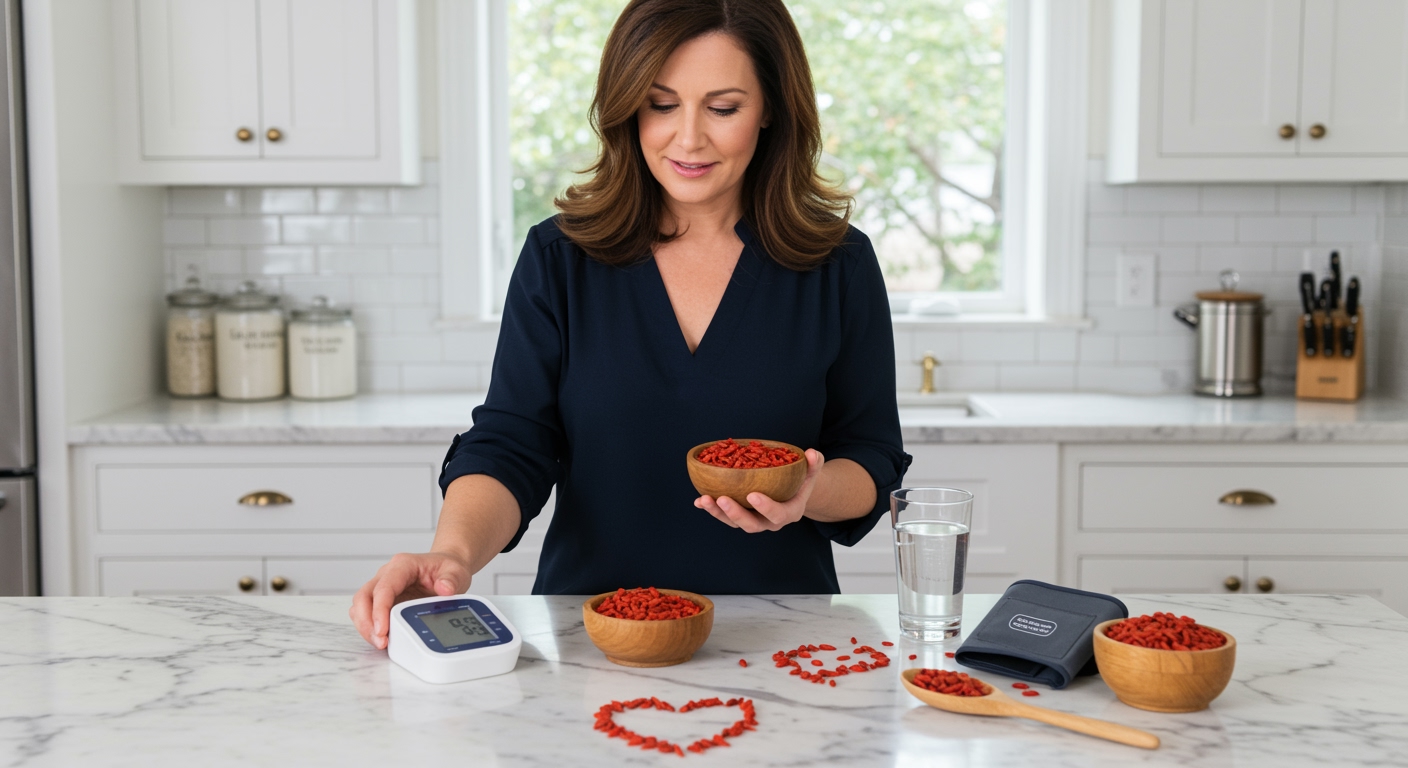✪ Key Takeaway: Goji berries may help lower blood pressure through antioxidants and potassium, but evidence remains limited and inconsistent.
Introduction
Your doctor just told you that your blood pressure numbers are creeping up, and now you are wondering if those expensive goji berries at the health food store can actually help.
You might be asking this question because you have heard claims about goji berries being a superfruit that can solve various health problems, including high blood pressure.
Hi, I am Abdur, your nutrition coach, and today I am going to explain whether goji berries can truly lower your blood pressure based on current scientific evidence.
What Does Science Say About Goji Berries and Blood Pressure?
The scientific evidence on goji berries and blood pressure shows mixed results that require careful interpretation.
A small study published in a nutrition journal found that people who consumed goji berry juice daily for 14 days experienced modest reductions in both systolic and diastolic blood pressure readings.
However, this study involved only 50 participants and lasted just two weeks, which makes it difficult to draw definitive conclusions about long-term effects.
Another research review suggested that goji berries might support cardiovascular health through their antioxidant properties, but the authors noted that more robust clinical trials are needed.
The challenge with goji berry research is that most studies have been small, short-term, or conducted in laboratory settings rather than with real people over extended periods.
While these preliminary findings are encouraging, they do not provide the strong evidence needed to recommend goji berries as a primary treatment for high blood pressure.
✪ Fact: Most goji berry studies on blood pressure have involved fewer than 100 participants and lasted less than three months.
How Might Goji Berries Affect Your Cardiovascular System?
Goji berries contain several compounds that could theoretically influence blood pressure through different biological mechanisms.
These small red berries are rich in potassium, a mineral that helps your kidneys remove excess sodium from your body, which can lead to lower blood pressure readings.
The berries also contain high levels of antioxidants called anthocyanins, which give them their red color and may help protect your blood vessels from damage.
Some researchers believe these antioxidants might improve the function of your endothelium, which is the thin layer of cells lining your blood vessels that helps regulate blood pressure.
Goji berries may also influence your body’s production of nitric oxide, a molecule that helps your blood vessels relax and widen, potentially reducing the pressure inside them.
However, the amounts of these beneficial compounds in goji berries may not be high enough to produce significant blood pressure changes when consumed in typical serving sizes.
✪ Pro Tip: One ounce of dried goji berries provides about 340 milligrams of potassium, which is roughly 7% of your daily needs.
What Are the Practical Limitations of Using Goji Berries?
While goji berries offer potential health benefits, several practical factors limit their effectiveness as a blood pressure solution.
The cost of goji berries is significantly higher than other fruits that provide similar or better cardiovascular benefits, such as blueberries, strawberries, or pomegranates.
You would need to consume relatively large amounts of goji berries daily to get meaningful doses of their active compounds, which could become expensive and impractical.
Many goji berry products on the market are processed, dried, or made into juices that may contain added sugars, which could actually counteract any potential blood pressure benefits.
Fresh goji berries are difficult to find in most grocery stores, and the dried versions often lose some of their nutritional potency during processing.
Some people may experience digestive upset, allergic reactions, or interactions with certain medications when consuming goji berries regularly.
The bottom line is that while goji berries are not harmful for most people, they are not a magic bullet for blood pressure management.
✪ Note: Goji berries can interact with blood-thinning medications and may affect blood sugar levels in people with diabetes.
What Foods Actually Work Better for Blood Pressure?
Instead of focusing on expensive superfruits like goji berries, you can achieve better blood pressure results with proven dietary approaches.
The DASH diet, which emphasizes fruits, vegetables, whole grains, and lean proteins while limiting sodium, has been shown in multiple studies to significantly reduce blood pressure.
Common foods like bananas, spinach, sweet potatoes, and beans provide more potassium per serving than goji berries at a fraction of the cost.
Berries that are more accessible and affordable, such as blueberries and strawberries, contain similar antioxidants and have more robust research supporting their cardiovascular benefits.
Reducing your sodium intake, maintaining a healthy weight, exercising regularly, and managing stress will have a much greater impact on your blood pressure than adding any single superfood to your diet.
If you enjoy goji berries and can afford them, they can be part of a healthy diet, but do not expect them to replace proven blood pressure management strategies.
✪ Pro Tip: A medium banana contains more potassium than an ounce of goji berries and costs significantly less per serving.
The Bottom Line
Goji berries may offer modest blood pressure benefits through their potassium content and antioxidants, but the current evidence is too limited to recommend them as a primary treatment for hypertension.
Real health improvements come from consistent daily habits, not expensive superfruits with fancy marketing claims.
I would love to hear your thoughts on this topic, so please share your questions, experiences, or feedback in the comments section below.
References
At NutritionCrown, we use quality and credible sources to ensure our content is accurate and trustworthy. Below are the sources referenced in creating this article:





